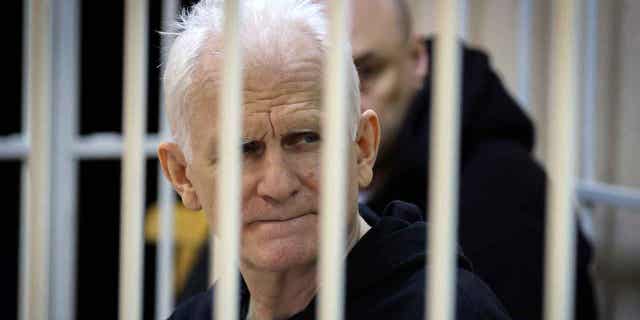A court on Friday sentenced Belarus’ top human rights advocate and one of the 2022 Nobel Peace Prize winners to 10 years in prison, the latest move in a year of crackdown on dissent that has swept the ex-Soviet nation from 2020.
The harsh punishment of Ales Bialiatski and three of his colleagues was meted out in response to massive protests over the 2020 election that gave authoritarian President Alexander Lukashenko a new mandate.
Lukashenko, a longtime ally of Russian President Vladimir Putin who supported Putin’s invasion of Ukraine, has ruled the former Soviet country with an iron fist since 1994. More than 35,000 people have been arrested and thousands are detained. been beaten by police during the protests, the largest ever held in the country.
Belarus is an exception in its support for a year-old Russian invasion, with other countries in the region not publicly supporting Moscow.
Bialiatski and his colleagues at the human rights center he founded were convicted of financing law-and-order actions and smuggling, the center said Friday.
Valiantsin Stefanovich was sentenced to nine years; Uladzimir Labkovicz seven years; and Dzmitry Salauyou was sentenced to eight years in prison in absentia.
THE NOBEL PRIZE FOR PEACE ASSIGNED TO ACTIVISTES FROM BELARUS, RUSSIA, UKRAINE
During the trial, which took place behind closed doors, the 60-year-old Bialiatski and his colleagues were held in a caged enclosure in the courtroom. They have spent a year and nine months behind bars since their arrest.
In photos of the courtroom released by Belarus’ state news agency Belta on Friday, Bialiatksi, dressed in black, looked pale but calm.
All four activists have maintained their innocence, the Viasna Human Rights Center said after the verdict. Viasna in Belarusian means “spring”.

Ales Bialiatski sits in a defendant’s cage during a court hearing in Minsk, Belarus January 5, 2023. A court has sentenced Ales Bialiatski, Belarus’ top human rights advocate, to 10 years in prison. (Pool photo by Vitaly Pivovarchyk/BelTA via AP, file)
In his final speech to the court, Bialiatski urged the authorities to “stop the civil war in Belarus”. He said it was evident to him from the case files that “the investigators were fulfilling the task that had been assigned to them: to deprive Viasna’s human rights defenders of their freedom at any cost, to destroy Viasna and stop our work.”
Exiled Belarusian opposition leader Sviatlana Tsikhanouskaya called the verdict “appalling”.
BELARUS ASKS LONG SENTENCES FOR OPPOSITION LEADERS
“We must do everything to fight this shameful injustice (and) set them free,” Tsikhanouskaya tweeted on Friday.
Memorial, the prominent Russian human rights group that shared the 2022 Nobel Peace Prize with Bialiatski, and the Ukrainian Center for Civil Liberties, denounced the verdict in an online statement as “blatant illegal retaliation for their activities.” on human rights as part of a campaign of terror against civil society and the entire Belarusian people”.
Memorial co-chair Oleg Orlov attempted to fly to Minsk on Friday to support Bialiatski but was prevented from boarding the flight, with airline representatives telling him Belarus had barred him from entering the country . “Crimes are best committed without witnesses,” Orlov noted.
The punishment also sparked outrage in the West.
The Norwegian Helsinki Committee, a non-governmental human rights organisation, said it was “shocked by the cynicism behind the convictions”.
German Foreign Minister Annalena Baerbock called the trial and conviction “a farce”.
CLICK HERE TO GET THE FOX NEWS APP
“This is as much a daily disgrace as Lukashenko’s support for Putin’s war,” Baerbock tweeted on Friday. “We call for an end to political persecution and freedom for the more than 1,400 political prisoners.”
Condemnations of the verdict also came from the Observatory for the rights of the Council of Europe and from the spokesman of the United Nations for human rights.
Bialiatski is the fourth person in the 121-year history of Nobel Prize winners to receive the prize while in prison or in detention.
